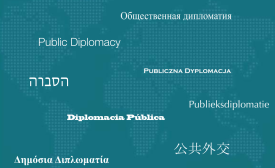public diplomacy
Culture defines the lives of Americans. Humans all over the world tend to find that common ground in points of cultural crossover. It’s a reasonable place to start. If Hip Hop has been its own diplomat until now, the logic goes, the U.S. Government shouldn’t be allowed to use it to begin build anything.
The conference underscored the importance of training and capacity building of personnel of the ministry...Opening of press sections in important capitals of Central Asia, Latin America, Africa, Eastern Europe and Australia was suggested...
A better question to ask today is, what has really changed since Harlem Rep. Adam Clayton Powell Jr. urged the State Department to set up the jazz tours as part of its cultural-diplomacy efforts during the Cold War?

The USC Center on Public Diplomacy has released its first issue of CPD Perspectives for 2012. Authored by CPD Research Fellow, Lina Khatib, the paper examines the image management strategy by Lebanese paramilitary political party Hizbullah over the past five years.
Events in Egypt and countries across the Middle East and North Africa have shown in the 'Arab Spring' that internet platforms and technologies should be seen for what they are: effective tools for the conduct of political campaigns in authoritarian contexts.
Water reveals a new apartheid in the Middle East...My most recent columns have been devoted to analyzing Israel’s public diplomacy, the reasons for its manifest ineptitude, and the mechanisms that produce this abysmal performance.
The State Department and USAID are critical to maintaining and extending American leadership, and we will be, in the future, called upon to do more, in more places, more frequently, and most likely with fewer resources.







